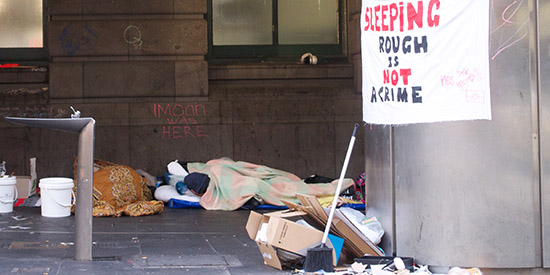Banning public camping a likely short-sighted solution with long-term costs
Media releaseMelbourne City Council's endorsement of a plan to ban people from camping in public is doomed to be a short-sighted solution with long-term costs, according to a Deakin University anthropologist.
Dr David Boarder Giles has spent more than a decade researching homelessness in Australia and the United State and said this move by the Council will not work.
“Laws prohibiting the homeless from sleeping, eating, soliciting, or, let’s face it, being seen at all in public, are older than most modern institutions. They have always been short-sighted political solutions, overshadowed by their long-term costs — financial costs to the city’s coffers, social costs to those sleeping rough, and moral costs to us all,” Dr Giles said.
“These laws don’t work because, common prejudices notwithstanding, homelessness is not a choice that can be discouraged—in my years of working in the field I have never met a single rough sleeper who would not prefer safe, dry accommodation.
“Instead, they represent a hefty burden on the public purse, and an even greater one on shelterless people. Police are tasked with ticketing or arresting them. The courts, with prosecuting them. And the jails, with housing them.
“Upon release, the shelterless (now criminals, vital possessions confiscated or discarded) find themselves further from stability than before. A cycle begins, ever more inescapable. And their number does not diminish.”
Dr Giles said there was good evidence that the money could be better spent supporting the shelterless than prosecuting them.
“State and city governments must invest more in public housing, and tame an inhumane housing market (with over 80,000 vacancies idling while rents rise),” he said.
“Programs like Housing First in the United States (and in Australian trials), show it is cheaper to simply give chronically homeless people shelter than to pay for the gamut of public services that accompany a life on the street.
“Despite their anti-homeless ordinances, some American cities offer other promising models in this regard—San Francisco and New York practice rent control, Seattle regulates prohibitive move-in costs.
“However even these measures will fail some people. We must be open to all possible options for equitable coexistence, from tiny homes, as in Portland’s Dignity Village, to city-sanctioned encampments and safe parking lots, as trialled by Seattle.
“In this, Melbourne has an opportunity to steer Australia along a different path from that taken by so many American cities. We have an opportunity to learn to share our home and earn the moniker ‘most liveable city’.”
Share this story

